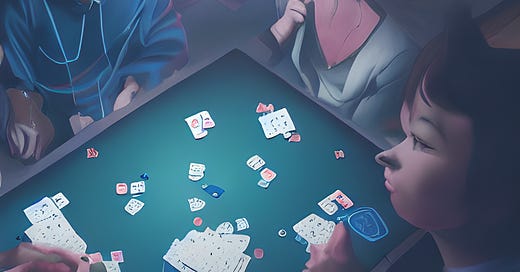The major entries in the glexicon are abstract, by design. We want concepts that work for the cold war as much as climate change. That’s why concepts such as Risk are better than concepts like Blockchain.
Every culture I know(of) has origin stories as well as extinction stories. What’s different about the modern world is in the role of risk in our calculations of flourishing and catastrophe.
A traditional Christian or Hindu might believe in the end of times (and the role of human sin/karma in making those time arrive) but they would do so against the background of eternal life and divine perfection in heaven or some other ideal world. Religious life means membership in the ‘certainty society,’ which is a society in which there’s some ultimate source of truth, value, faith etc.
In contrast, we moderns take the risky life to be the only life we’ll have; the goal isn’t to negotiate risk in preparation for a better world in the afterlife, but to optimize one’s chances in the here and now. The horizon isn’t heaven. There may be no horizon, and even if there’s one, it’s not supernatural.
Required reading: Ulrich Beck - “The Risk Society”.
The Risk Society is an essential feature of the Globe
Risk; Extinction, Uncertainty, Contingency. These terms and their cognates are the first cluster of concepts I want to explore in the glexicon. Extinction lies at the limit of risk. I don’t want to be a downer, but in the long run we are all dead - and that’s as true of the species as it’s true of the individual. Extinction is inevitable, but that doesn’t mean we shouldn’t try to prevent it when we can (like keeping track of asteroids) and certainly prevent ourselves from being its main cause. '
Required reading: Toby Ord, “Precipice.”
Required reading doesn’t mean I agree with the text or even consider to be important. It just means the book/article represents a viewpoint that must be considered. Of course, I would rather read something I like and whose importance is undeniable but that’s the risk we take when cracking open any book, don’t we?
But we should also prepare for the worst and ask how some of us might survive the apocalypse.
Required reading: Hermann Kahn’s “On Thermonuclear War.”
Caveat Venditor: everyone and their mother has written a book on risk so I’m taking a big risk by devoting time & energy on a topic where the barrier to originality is high. But if I may be so bold: the systematic cultivation of risk is the driving force of modernity, the source of much of its good and evil, order and chaos.
Risk doesn’t stop with war or society; sooner or later, we have to acknowledge the possibility of risk everywhere, including our ways of knowing and arguably, in the fabric of the universe itself. Probability has become the preferred framework for reasoning about risk.
Optional reading (not required because it’s technical and dense): Oxford Handbook of Philosophy and Probability.
And finally, we come to the primary instrument of risk: both the means through which make our bets and assess their consequences. You guessed it: 💰💰💰. The scolds complain that money has become the source of all meaning - replacing God and Family and everything good and true. That complaint makes sense in a certainty society where God (or the axioms of set theory) backstops every decision. But citizens of a risk society intuitively know there is no court of last appeal with a kindly judge who will take our foibles into account before pronouncing judgment. Might as well pray to the only lever that moves the world: 💰💰💰.
Required reading: Eugene McCarrahar, “The Enchantments of Mammon.”
👉🏾 👉🏾 : the Glexicon (such as risk) reveals itself everywhere - economy, society, philosophy…..



